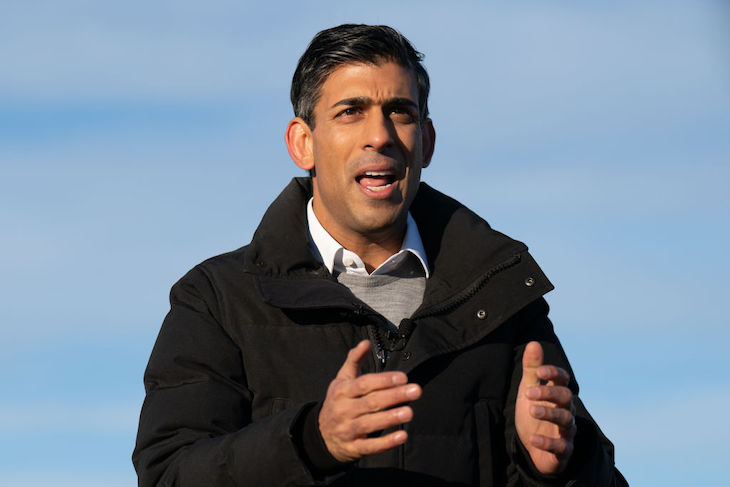There have been two major reactions to reports that Rishi Sunak is ready to take Britain out of the European Convention on Human Rights if that’s what it takes to solve the small boats issue in the Channel.
The first, common among denizens of the Westminster village, is surprise that an outwardly conventional product of the system would even contemplate such a radical move. The second, prevalent among disenchanted former Tory voters on social media, is a diamond-hard cynicism that tells them they are being conned again and he will never do it. After 13 consecutive years of Conservative failure to get on top of immigration – either legal or illegal – despite numerous airy promises that overall volumes will come down and those arriving on dinghies will be ‘sent back’ this is quite understandable.
It is quite likely that the ECHR will not give Sunak the flexibility he requires
But circumstances are very different now and Sunak’s approach is far more strategic and clear-eyed than Boris Johnson’s ever was. The Prime Minister knows his party is in a hole on illegal immigration, that its core voters have lost faith in it and that the issue really matters. He understands that just talking a good game, as his flamboyant predecessor did for so long, is now worse than useless.
He has even incorporated stopping the boats as one of five core goals by which he asks that his premiership should be judged. Like Liz Truss before him, he cannot compete with Johnson as a natural communicator. So ‘does what it says on the tin’ is his only hope. And one thing he wrote on his tin, in large print, is ‘stop the boats’.
This means that we are indeed on a conveyor belt to a second Brexit: Britain’s exit from the European human rights architecture constructed after World War Two.
Rather as was the case with the first Brexit, the key European institution involved – this time round the European Court of Human Rights – can choose to avert such an outcome by offering the UK sufficient room for manoeuvre to keep it within the club. In the case of the ECHR, this would mean it accepting a clause in impending UK legislation stating that British courts should effectively ignore its rulings on asylum and immigration matters.
Our courts would then prioritise an explicit new legal duty to be placed on Home Secretaries to deport migrants who arrive illegally. The ECHR would keep its nose out. And removals to countries of origin or third countries, such as Rwanda, would soon enough kill the incentive for anyone to pay for a place in a dinghy across the Channel. Job done.
Alternatively, the ECHR could just carry on interfering, ruling removals unlawful and kicking sand in Sunak’s face. In those circumstances, Sunak will not be able to back down as doing so would ignite an actual extinction rebellion among Tory-leaning voters at the next election.
It is the very weakness of the Prime Minister’s position – and that of his party after a long and traumatic period in office – that has opened up a pathway for Britain to become the first major European nation to modernise its asylum system properly.
As projections of 65,000 small boat arrivals this year show, in the age of mass travel and communication, it is unsustainable to have a universal right to claim asylum based on physically arriving in a country of choice. A new system, under which Britain sets an annual quota for refugees and then actively selects those from around the world with the strongest cases – and ensures women and children are properly represented among them – must be introduced.
It is quite likely that the ECHR will not give Sunak the flexibility he requires and will instead bet the ranch on a Labour victory at the next UK general election. This is, after all, what all the opinion polls are pointing to. Doing so, would mean the ECHR and its allies across the British establishment indulging in what is known in professional rugby as ‘game management’: blocking, obstructing and running the clock down until a dominant position is turned into an actual victory.
But the danger of that approach is that it could rejuvenate the Conservative party in the eyes of its potential supporters. ‘Get the Boats Stopped’ could become the new ‘Get Brexit Done’ and Sunak could make leaving the ECHR the top line of an election manifesto if he has been thwarted from enacting his policy by the House of Lords and all the other usual suspects.
Would it be enough to bring about an unlikely fifth consecutive term of Tory-led government? With living standards in a slump, the NHS ailing and most voters thinking the country is going in the wrong direction, conventional wisdom would say not.
But establishment conventional wisdom thought Remain would win the EU referendum and that there would be a hung parliament after the last election. And it was the strength of public scepticism about uncontrolled immigration, more than any other factor, which meant those contests did not turn out that way.
Equally, the anti-establishment conventional wisdom that has it that Sunak is ‘Davos Man’ and will never do anything to rock the boat may also have it wrong. Above all, the PM is someone who can read charts and spot trends. Having staked his reputation on securing a particular outcome, I think he is going to play all his cards to try and achieve it.







Comments